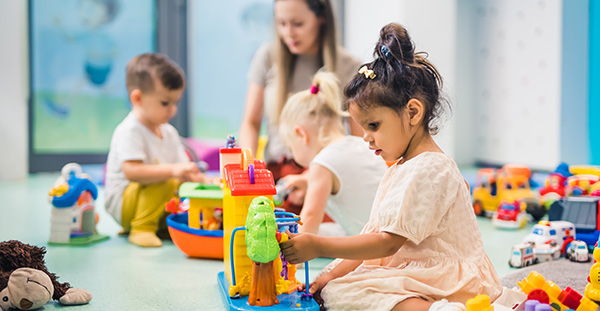01 Apr 2025
What Ages Does Early Childhood Education Cover?
As an Early Childhood Educator, you’ll shape children's first learning experiences. You'll support children's skill development from their first days to school entry.
There are four main stages of Early Childhood Education, which focus on different areas of learning and development. In each stage, Early Childhood Educators come up with age-appropriate curriculums to help children become the best versions of themselves and smoothly transition into secondary education.
Let’s explore the stages of Early Childhood Education to learn where you can make a difference in children's learning journeys.
Early childhood age range in Australia
What’s considered early childhood? As an Early Childhood Educator, you can be involved from infancy right up until it’s time to go to primary school. The age range spans from a few months to around six years old.
Not every child will have the same developmental journey, but these stages are a guide to help.
Infancy (0–2 years)
The first two years of children’s lives are all about sensory experiences. Programs created for infants usually focus on giving emotional support and developing motor skills.
Early Childhood Educators working with infants usually work in long day-care centres or family day-care settings. Your role here will involve close one-on-one care, responding to needs and supporting early development through play, music or even simple routines like reading and naptime.
Toddlers (2–3 years)
Toddlers are full of energy and are just starting to develop their speaking skills. At this age, curriculums focus on play and building social confidence.
Childcare workers support toddlers in long day-care centres, early learning centres or even family day-care. You’ll help guide toddlers through daily routines, social interactions and play-based, hands-on activities. You really get to see their personalities blossom here as toddlers begin to come out of their shells and transition into the next stage of education.
Preschoolers (3–5 years)
Preschool introduces more of a structured learning system. Early Childhood Educators lean into strengthening children’s literacy, numeracy and social skills through learning and play, drawing on what they’ve learned in their toddler years.
As a childcare worker in this stage, you’ll usually work in community kindergartens, preschools or early childhood centres. You’ll plan and deliver learning experiences that prepare children for school, help them build relationships and support their emotional development.
School Readiness (4–6 years)
This is the final stage that bridges the gap between little school and big school. You’ll see children start to take on math and spelling tasks that prepare them for primary school. Some four-year-olds start primary school if they’re ready, while others stay in preschool until age five or six. Parents in this stage can choose whatever works best based on their child’s individual needs.
As an Educator in this final stage, you’ll work in preschool programs, long day care or early intervention services. You’ll support each child’s readiness for school by promoting confidence, independence and familiarity with classroom routines. You’re essentially getting them as ready as possible to transition into their next big adventure.
Early Childhood Education frameworks by age range
Australia has a few Early Childhood Education frameworks that guide teaching and curriculum development. The Early Years Learning Framework (EYLF) is the main one, designed to adapt to children at any developmental stage.
Rather than dividing teaching approaches by age, it focuses on learning outcomes that apply to any age group. This way, EYLF grows with the child rather than forcing development into predetermined age boxes.
For example, outcome three, which focuses on creating a strong sense of wellbeing, might look a little different in infancy than for preschoolers. Early Childhood Educators help infants focus on responsive caregiving with consistent, gentle routines. For preschoolers, wellbeing can extend to collaborative games and developing self-regulation skills needed for school.
You’ll learn all about how to adapt to support different age groups while you complete your Early Childhood Education qualification.

Early Childhood Courses at Foundation Education
Working in Early Childhood Education means you get to be part of children's most important learning years. You'll help kids discover the world around them — from babies taking their first steps to preschoolers getting ready for big school.
An Early Childhood Education course will give you the tools to support children at every age and stage of their development. At Foundation Education, our Foundation CHC30121 Certificate III in Early Childhood Education and Care and CHC50121 Diploma of Early Childhood Education and Care can prepare you for a career where you’ll design great learning experiences that support kids up to age five or six.
Start your Early Childhood Education journey today. Get in touch with us to come up with a learning plan that matches your career goals and unique situation.
Proud member of

Funding
© Foundation Education | RTO Number 22557
